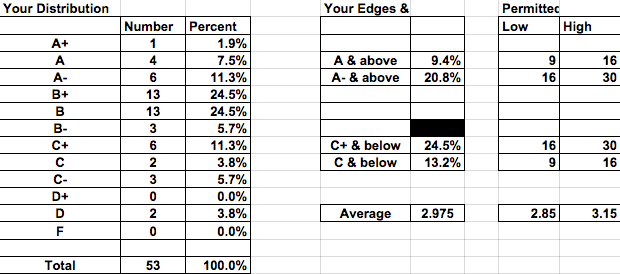I have now finished grading your constitutional law midterms. You can download the exam here, and the A+ paper is here. Here is the distribution.
To be frank, I had fairly high expectations for this section–based on engaging class discussions–but the exams were disappointing. The exams at the top of the class were excellent, but there was a sharp drop-off after the A- papers. Many of you missed the recognition issue, even though we spent an entire class period on exploring its meaning with Zivotofsky. Many of you missed the recess appointment issue, even though we spent a lot of time with it on Noel Canning. Many of you repeated maxims about ambition checking ambition without any context–as if you were trying to write something to score points. That won’t work. I can tell when you are fudging the answers. Also, given a 1,000 word limit, many of you couldn’t muster more than 500 or 600 words. Use the space you are given to show me what you’ve learned. You can do better. Last spring, the average score for my ConLaw final was 3.13. Yours was 2.975. Let’s try to get above a 3.0–and hopefully higher–for the final exam.
Here are some high-level observations about each question.
- The first question tested whether you could explain the recognition power of the executive. Although it is not clearly defined, it can be understood asa n extension of the President’s powers to receive ambassadors, appoint ambassadors, and negotiate treaties. Although the latter two are powers that are exercised concurrently with Congress, the reception clause is exercised independently. As the question was framed, the year is 1789. Citing Zivotofsky does not work. Ditto for Youngstown. Further, recognizing foreign countries is not ratifying a treaty, so the Senate would not need to vote on this.
- Although the President’s recognition power is likely exclusive, Congress remains free to use its powers over foreign commerce to affect relations with other nations. The Spanish Loyalty Act, even if it interfered with the President’s priorities were lawful.
- The question of whether the Senate has a role in removal is not clearly addressed by the Constitution, but due to the text of the appointments clause, the better argument is that Congress only needs to provide its “advice and consent” for the appointment. The famous “Decision of 1789” resulted in a tie vote in the Senate, with VP Adams casting a vote that the President did not need to seek the Senate’s permission before removal.
- This question tested whether a three-day intra-session recess was sufficient to trigger the President’s recess-appointment power. The better answers distinguished between inter-session and intra-session recesses, and explained if three-days was sufficient. Again, merely citing Noel Canning did not score any points.
- The final question gave you the most latitude. It can be argued (persuasively) that the Commander in Chief does not need a declaration of war, and the role of Congress was merely declaratory. Also, the President could have the power to repeal an imminent attack. Finally, arguably, Congress did authorize the attack, as it declared war against France. The President determined that Mexico was under French sovereignty, so he could rely on that authorization for use of military force.
As an aside, there were several close-to-real-life events in this troubling fact pattern.
- The first sentence is a paraphrase of Washington’s neutrality proclamation. “Shortly after President Washington’s inauguration on April 30, 1789, the peace and prosperity of the United States quickly became entangled in the toils of European ambition, rivalship, interest, humor, and caprice. “
- Citizen Genet visited the United States a few years earlier in this question.
- Washington did appoint Marshall as a minister to France, but he declined. Marshall did accept Adams’s appointment to the three-member commission in 1797, along with Charles Pinckney and Elbridge Gerry. Soon they would become embroiled in the XYZ affair.
- The article of impeachment is paraphrased from the articles against Andrew Johnson. “That said George Washington, President of the United States, on the 1st day of October, in the year of our Lord, 1789, unmindful of the high duties of his office, of his oath of office, and of the requirement of the Constitution that he should take care that the laws be faithfully executed, did unlawfully and in violation of the Constitution and laws of the United States engage in a state of war with Mexico, whereby said George Washington, President of the United States, did then and there commit, and was guilty of a high misdemeanor in office. “
